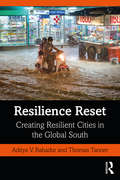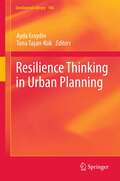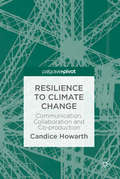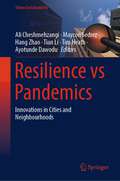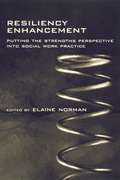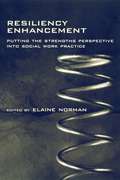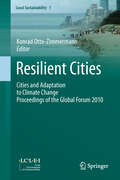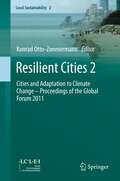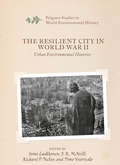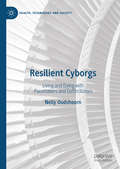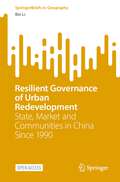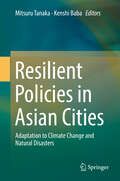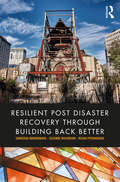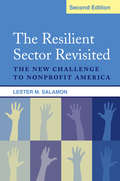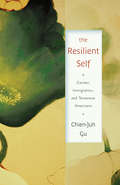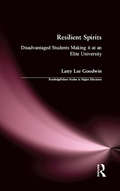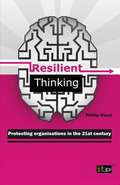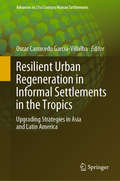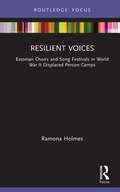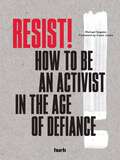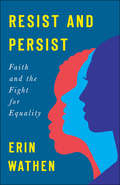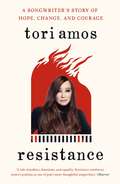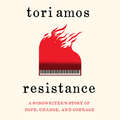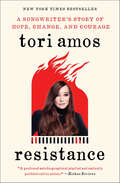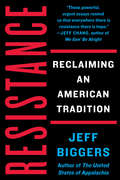- Table View
- List View
Resilience Reset: Creating Resilient Cities in the Global South
by Aditya V. Bahadur Thomas TannerDrawing on evidence from urban resilience initiatives around the globe, the authors make a compelling argument for a "resilience reset", a pause and stocktake that critically examines the concepts, practices and challenges of building resilience, particularly in cities of the Global South. In turn, the book calls for the world’s cities to alter their course and "pivot" towards novel approaches to enhancing resilience. The book presents shifts in ways of acquiring and analysing data, building community resilience, approaching urban planning, engaging with informality, delivering financing, and building the skills of those running cities in a post-COVID world grappling with climate impacts. In Resilience Reset, the authors encourage researchers, policymakers, and practitioners to break out of existing modes of thinking and doing that may no longer be relevant for our rapidly urbanising and dynamic world. The book draws on the latest academic and practice-based evidence to provide actionable insights for cities that will enable them to deal with multiple interacting shocks and stresses. The book will be an indispensable resource to those studying urbanisation, development, climate change and risk management as well as for those designing and deploying operational initiatives to enhance urban resilience in businesses, international organisations, civil society organisations and governments. It is a must-read for anyone interested in managing the risks of climate impacts in urban centres in the Global South.
Resilience Thinking in Urban Planning
by Tuna Taşan-Kok Ayda EraydinThere is consensus in literature that urban areas have become increasingly vulnerable to the outcomes of economic restructuring under the neoliberal political economic ideology. The increased frequency and widening diversity of problems offer evidence that the socio-economic and spatial policies, planning and practices introduced under the neoliberal agenda can no longer be sustained. As this shortfall was becoming more evident among urban policymakers, planners, and researchers in different parts of the world, a group of discontent researchers began searching for new approaches to addressing the increasing vulnerabilities of urban systems in the wake of growing socio-economic and ecological problems. This book is the joint effort of those who have long felt that contemporary planning systems and policies are inadequate in preparing cities for the future in an increasingly neoliberalising world. It argues that "resilience thinking" can form the basis of an alternative approach to planning. Drawing upon case studies from five cities in Europe, namely Lisbon, Porto, Istanbul, Stockholm, and Rotterdam, the book makes an exploration of the resilience perspective, raising a number of theoretical debates, and suggesting a new methodological approach based on empirical evidence. This book provides insights for intellectuals exploring alternative perspectives and principles of a new planning approach.
Resilience to Climate Change: Communication, Collaboration and Co-production
by Candice HowarthThe frequency and intensity of climate shocks such as heatwaves and flooding, are expected to increase under a changing climate with severe implications across the food, energy, water, environment nexus. This book critically explores how to improve resilience to climate shocks by examining the range of challenges and opportunities that exist in the aftermath of shocks and discusses factors that exacerbate and mitigate these. It innovatively discusses the importance of embedding communication, collaboration and co-production within resilience-building across sectors and stakeholders. Doing so with policy, practitioner and scientific communities, Candice Howarth argues, can pave the way to overcome challenges that emerge from climate shocks and facilitate the co-design of sustainable, robust and resilient responses.
Resilience vs Pandemics: Innovations in Cities and Neighbourhoods (Urban Sustainability)
by Ali Cheshmehzangi Maycon Sedrez Hang Zhao Tian Li Tim Heath Ayotunde DawoduThe COVID-19 pandemic and other highly transmissible diseases outbreaks have given a new significance to the concept of “resilience”, placing it in the spotlight of built environment-related studies. New directions have emerged from expanding on adaptive planning, urban layouts, urban morphologies, spatial planning, healthy cities, etc. To enhance resilience in the post-pandemic era, various theories, practices, and hypotheses are being formulated by scholars around the world.For this book project, we invite chapter proposals that provide forefront discoveries about the built environment resilience during and after the ongoing pandemic. Historical perspectives of resilience and other highly transmissible diseases are also relevant to understanding the COVID-19 issues. The authors are encouraged to elaborate on critical exploratory, innovative, and cutting-edge research approaches, highlighting the effects of COVID-19 and other highly transmissible diseases in the design, planning, and perception of the built environment. We aim to gather scientific experiences, reviews, analyses, discussions, recommendations, and solutions in the fields of urban planning, urban design, urban management, environmental science, architecture, etc.The book aims to document resilience-related innovations and new perspectives for the built environment, how people’s interactions adapt to new realities, and which mechanisms, tools, and strategies are required for such transformations in the following two scales of the built environments:(1) City/district; research on planning, commuting and mobility, politics, urban configurations, regulations, transmission and prevention, models, top-down processes, innovation processes, etc.(2) Community/neighborhood; research on collaboration, transmission and prevention, isolation and quarantine, social aspects, accessibility to services, technologies, education, policies, and innovative solutions.The book covers a wide range of studies, including physical and non-physical studies, which may refer to the city infrastructure, green/blue spaces, housing, policy-making, health services, social and economic issues, etc. The findings and results contribute to the decision-making of governments, organizations, and institutions, as well as inspire scholars and future research for developing resilience in the post-pandemic era.
Resiliency Enhancement: Putting the Strength Perspective Into Social Work Practice (Social Work)
by Elaine NormanThis book bridges the gap between theory and implementation to illustrate how resiliency enhancement enables social workers to put the strengths perspective successfully into practice for their clients. Contributors to this volume show how social workers can use interventions to enhance those resiliency factors.
Resiliency Enhancement: Putting the Strength Perspective Into Social Work Practice (Social Work)
by Elaine NormanThis book bridges the gap between theory and implementation to illustrate how resiliency enhancement enables social workers to put the strengths perspective successfully into practice for their clients. Contributors to this volume show how social workers can use interventions to enhance those resiliency factors.
Resilient Cities: Cities and Adaptation to Climate Change - Proceedings of the Global Forum 2010
by Konrad Otto-ZimmermannEven with significant reductions of greenhouse gas emissions, a certain degree of climate change will inevitably occur. Adapting to climate change, then, will become a necessary step in reducing the vulnerability of many regions across the globe. This is especially true for urban areas where climate change has been shown to have particularly destabilizing effects. Through the identification and analysis of the most relevant impacts facing urban areas, this book makes clear the need to incorporate climate change concerns into the mainstream of local planning, governance and policy making practices. Adaptation as a workable concept within urban areas cannot be treated in isolation from the many pre-existing challenges facing cities. By offering numerous examples of ongoing adaptation programs and strategies across a wide range of contexts, the authors show the growing potential of cities in the fight against climate change. This book has its origins in a collection of papers originally presented at the Resilient Cities 2010 Congress in Bonn, Germany (May 2010), the first global forum on cities and adaptation to climate change, convened by ICLEI - Local Governments for Sustainability. In this volume, the first in a new series dedicated to this annual event, a range of contributors bring their perspectives to bear on the most pressing issues and controversies surrounding adaptation to climate change within cities. These writings will prove invaluable to anyone interested in understanding and confronting climate change at the local level.
Resilient Cities 2
by Konrad Otto-ZimmermannAssembling papers originally presented at the Resilient Cities 2011 Congress in Bonn, Germany (June 2011), the second global forum on cities and adaptation to climate change, this volume is the second in a series resulting from this annual event. These cutting-edge papers represent the latest research on the topic and reflect the intensification of the debate on the meaning of and interaction between climate adaptation, risk reduction and broader resilience. Thus, contributors offer more material related to resilience, such as water, energy and food security; green infrastructure; the role of renewables and ecosystem services; vulnerable communities and urban poor; and responsive financing for adaptation and multi-level governance. Overall, the book brings a number of different perspectives to bear on the most pressing issues and controversies surrounding climate change adaptation in cities. These papers will prove invaluable to anyone interested in deepening their understanding of urban resilience and contributing to tackling climate change at the local level.
The Resilient City in World War II: Urban Environmental Histories (Palgrave Studies in World Environmental History)
by J. R. McNeill Richard P. Tucker Simo Laakkonen Timo VuorisaloThe fate of towns and cities stands at the center of the environmental history of World War II. Broad swaths of cityscapes were destroyed by the bombing of targets such as transport hubs, electrical grids, and industrial districts, and across Europe, Asia, and the Americas, urban environments were transformed by the massive mobilization of human and natural resources to support the conflict. But at the same time, the war saw remarkable resilience among the human and non-human residents of cities. Foregrounding the concept of urban resilience, this collection uncovers the creative survival strategies that city-dwellers of all kinds turned to in the midst of environmental devastation. As the first major study at the intersection of environmental, urban, and military history, The Resilient City in World War II lays the groundwork for an improved understanding of rapid change in urban environments, and how societies may adapt.
Resilient Cyborgs: Living and Dying with Pacemakers and Defibrillators (Health, Technology and Society)
by Nelly OudshoornThis book examines how pacemakers and defibrillators participate in transforming life and death in high-tech societies. In both popular and medical accounts, these internal devices are often portrayed as almost magical technologies. Once implanted in bodies, they do not require any ‘user’ agency. In this unique and timely book, Nelly Oudshoorn argues that any discourse or policy assuming a passive role for people living with these implants silences the fact that keeping cyborg bodies alive involves their active engagement. Pacemakers and defibrillators not only act as potentially life-saving technologies, but simultaneously transform the fragility of bodies by introducing new vulnerabilities. Oudshoorn offers a fascinating examination of what it takes to become a resilient cyborg, and in the process develops a valuable new sociology of creating ‘resilient’ cyborgs.
Resilient Governance of Urban Redevelopment: State, Market and Communities in China Since 1990 (SpringerBriefs in Geography)
by Bin LiTo examine the origins, characteristics, and outcomes of resilient governance with Chinese characteristics, this open access book takes Guangzhou, a typical Chinese city from 1990 to 2015, as an example. Through participant observation, semi-structured interviews, and the collection of secondary data, this book finds that (1) the institutional context can be described as an authoritarian land-oriented pro-growth regime; (2) there are three phases with different patterns of governance: the Primitive Market Phase (1990–1998), the Pure Government Phase (1998–2006) and the Multiple Players Phase (2006–2015); (3) redevelopment can serve as a model of resilient governance because it changes in time in a dynamic environment to maximise economic growth; (4) an authoritarian land-oriented pro-growth regime is the key to support such a resilient governance model. This is an open access book.
Resilient Policies in Asian Cities: Adaptation to Climate Change and Natural Disasters
by Mitsuru Tanaka Kenshi BabaThis book presents a comprehensive framework and indicators that can be used to assess a city’s degree of resilience. Based on surveys using bottom-up assessment tools, it proposes the concept, framework and indicators of a resilient policy model (including some participatory approaches). It also presents case studies of this and similar tools applied to Japanese and Asian cities, the highlights including information not previously available in English. Today, the term “resilience” is prevalent in the context of sustainable societies. The IPCC AR5 published in 2014 again stressed the impact of climate change on natural disasters, while in March 2015 at the World Conference on Disaster Risk Reduction, the United Nations International Strategy of Disaster Reduction (UNISDR) published the Sendai Framework for Disaster Risk Reduction Action 2015-2030 , which serves as a guideline for local governments. Offering transdisciplinary perspectives from fields such as policy science, urban planning, environmental science, social psychology, management development and geography, this book discusses the lessons learned from Asian case studies, explaining the challenges and the effectiveness of the tools, and offering transdisciplinary insights for policymakers.
Resilient Post Disaster Recovery through Building Back Better
by Sandeeka Mannakkara Suzanne Wilkinson Regan Potangaroa<p>“Building Back Better” (BBB) has been a popular slogan in disaster recovery efforts around the world, including the 2004 Indian Ocean Tsunami, the 2009 Samoan Tsunami, the 2010 Haiti Earthquake and the 2011 Great East Japan Earthquake. BBB has recently been identified as one of four priorities of action for disaster risk reduction globally in the next 15 years by the United Nations Sendai Framework. However, there has consistently been a mismatch and confusion in the interpretation of the phrase and what BBB encapsulates which has made proper implementation difficult and unsuccessful at times. <p>This book explains the concept of “Building Back Better” as an innovative holistic approach to rebuilding a community following a disaster event in order to develop resilience. It begins by exploring the background, development and definitions of BBB. The theory behind establishing BBB as a holistic concept is explained and the internationally recognised BBB Framework developed by the authors is introduced and described. Each of the components of the Framework is explained in detail with findings from international research and case studies from the US, Haiti, Indonesia, Samoa, Sri Lanka, Vanuatu, Gaza, China, Australia, the UK and New Zealand, providing practical recommendations for implementation in recovery projects. There is a focus on the translation of BBB theory into practice to assist implementers to use the BBB Framework and BBB Indicators introduced in this book as effective tools to plan and implement disaster recovery projects. <p>This publication can be used as a handbook by government, non-governmental and private industry practitioners to prepare for and implement post disaster recovery projects that benefit and strengthen local communities and as a core text on international Disaster and Energy Management courses.</p>
The Resilient Sector Revisited
by Lester M. LockwoodNonprofit America is one of the least understood segments of national life, yet also one of the most crucial.Author Lester Salamon, who pioneered the empirical study of the nonprofit sector in the United States, provides a wealth of new data to paint a compelling picture of a set of institutions being buffeted by a withering set of challenges, yet still finding ways to survive and prosper. These challenges, however, are posing enormous risks to the historic character and role of nonprofits.Operating in an increasingly competitive environment in which traditional sources of government and philanthropic support are difficult to maintain, nonprofits have turned decisively to the market. In the process, however, they may be losing their raison d'être, sacrificing their most crucial missions, and risking loss of public understanding and support.To remedy this situation, Salamon recommends a "renewal strategy" for the nation's nonprofit sector that begins with a wider articulation and application of the sector's "value proposition"-the attributes that continue to make it deserving of the special privileges and benefits it enjoys. Salamon's pithy and accessible book is perfect for nonprofit boards, leaders of charitable foundations, government officials, and students of the nonprofit sector and of public policy, as well as anyone looking for guidance on how we go about dealing with public problems in America's increasingly collaborative system of governance.
The Resilient Self: Gender, Immigration, and Taiwanese Americans
by Chien-Juh GuThe Resilient Self explores how international migration re-shapes women’s senses of themselves. Chien-Juh Gu uses life-history interviews and ethnographic observations to illustrate how immigration creates gendered work and family contexts for middle-class Taiwanese American women, who, in turn, negotiate and resist the social and psychological effects of the processes of immigration and settlement. Most of the women immigrated as dependents when their U.S.-educated husbands found professional jobs upon graduation. Constrained by their dependent visas, these women could not work outside of the home during the initial phase of their settlement. The significant contrast of their lives before and after immigration—changing from successful professionals to foreign housewives—generated feelings of boredom, loneliness, and depression. Mourning their lost careers and lacking fulfillment in homemaking, these highly educated immigrant women were forced to redefine the meaning of work and housework, which in time shaped their perceptions of themselves and others in the family, at work, and in the larger community.
Resilient Spirits: Disadvantaged Students Making it at an Elite University (RoutledgeFalmer Studies in Higher Education)
by Latty Lee GoodwinThis study explores the identity construction of socioeconomically and educationally disadvantaged students who enter an elite university. This critical ethnography gathered qualitative data about the twenty-three participants through non-participant observation, in-depth interviews, and focus groups. Faculty, staff, and administrators were also interviewed.
Resilient Thinking
by Phillip WoodIt'll never happen to us . . . Or will it? There are no guarantees. Disasters happen. Can you be sure they won't happen to your organisation? And are you prepared if they do? No two businesses are the same. They all have different objectives, different values and different ways of working. External factors always have an effect - good or bad - and the impact is different for every company. In times of crisis, the effectiveness of 'one-size-fits-all' plans and checklists is, therefore, limited. In Resilient Thinking, Phillip Wood discusses the importance of thinking laterally about potential impacts on your organisation and examines a new approach to resilience management. As you read this book you will learn how to recognise potential risks and threats, put cost-effective and workable plans into place and minimise the impact of an incident. Your efficiency and profitability will improve, as you critically assess your organisation's and your own strengths and weaknesses and are able to make reasoned, rather than impulsive, decisions within the current business climate. You will know how to protect your assets and key stakeholder relationships, and how to obtain the buy-in of all departments and employees. Resilient Thinking will help you maintain your competitive edge, as you draw on knowledge gained through your experience and that of your competitors. Resilient Thinking will revolutionise your approach to risk analysis and crisis management. Even if the worst does happen, you will be fully equipped to handle it. About the author Phillip Wood MBE has extensive knowledge and experience in a wide range of security and resilience disciplines. He has delivered security, resilience and business continuity education and consultancy in a number of different countries and to numerous organisations. . He is currently Head of the Department of Security Studies at Buckinghamshire New University. Be equipped. Be prepared. Be ready.
Resilient Urban Regeneration in Informal Settlements in the Tropics: Upgrading Strategies in Asia and Latin America (Advances in 21st Century Human Settlements)
by Oscar Carracedo García-VillalbaThis book focuses on the implementation of slum upgrading projects and the last generation of citywide programmes that define the future urban configuration of informal settlements, from a citywide perspective, in the Earth’s tropical region. The book presents a study on regeneration experiences in Asia and Latin America and it identifies important points of connection and similarities between the two cases, while also determining that, compared to Asia, informality in Latin America is in its ‘second generation.’
Resilient Voices: Estonian Choirs and Song Festivals in World War II Displaced Person Camps
by Ramona HolmesThe aftermath of World War II sent thousands of Estonian refugees into Europe. The years of Estonian independence (1917-1940) had given them a taste of freedom and so relocation to displaced person (DP) camps in post-war Germany was extremely painful. One way in which Estonians dealt with the chaos and trauma of WWII and its aftermath was through choral singing. Just as song festivals helped establish national identity in 1869, song festivals promoted cultural cohesiveness for Estonians in WWII displaced person camps. A key turning point in hope for the Estonian DPs was the 1947 Augsburg Song Festival, which is the center point of this book. As Estonian DPs dispersed to Australia, Canada, Europe, and the United States these choirs and song festivals gave Estonians the resilience to retain their identity and to thrive in their new homes. This history of Estonian WWII DP camp choirs and song festivals is gathered from the stories of many courageous individuals and filled with the tenacious spirit of the Estonian singing culture. This work contributes to an understanding of immigration, identity, and resilience and is particularly important within the field of music regarding music and healing, music and identity, historical musicology, ethnomusicology, and music and politics.
Resist!: How to Be an Activist in the Age of Defiance
by HuckResist! is the indispensable how-to guide for people looking to make a stand. Included are solid pieces of advice, practical tips and inspirational stories from those who have already successfully stood up and made a difference. Learn the principles of direct action, discover strategies for tackling social media, unearth ideas for motivating others, and understand how to get access to the people in power and get your message across.With a foreword by columnist, campaigner and best-selling author Owen Jones which unravels the political world and underlines why now is the time to act.
Resist and Persist: Faith And The Fight For Equality
by Erin WathenOver the past few decades, the roles women play in public life have evolved significantly, as have the pressures that come with needing to do it all, have it all, and be all things to all people. And with this progress, misogyny has evolved as well. Today's discrimination is more subtle and indirect, expressed in double standards, microaggressions, and impossible expectations. In other ways, sexism has gotten more brash and repulsive as women have gained power and voice in the mainstream culture. <P><P>Patriarchy is still sanctioned by every institution: capitalism, government, and even--maybe especially--the church itself. This is perhaps the ultimate irony--that a religion based on the radical justice and liberation of Jesus' teachings has been the most complicit part of the narrative against women's equality. If we are going to dial back the harmful rhetoric against women and their bodies, the community of faith is going to have to be a big part of the solution. <P><P>Erin Wathen navigates the complex layers of what it means to be a woman in our time and place--from the language we use to the clothes that we wear to the unseen and unspoken assumptions that challenge our full personhood at every turn. Resist and Persist reframes the challenges to women's equality in light of our current culture and political climate, providing a new language of resistance that can free women and men from the pernicious power of patriarchy.
Resistance: A Songwriter's Story of Hope, Change and Courage
by Tori AmosSince the release of her first, career-defining solo album Little Earthquakes, Tori Amos has been one of the music industry's most enduring and ingenious artists. From her unnerving depiction of sexual assault in "Me and a Gun" to her post-9/11 album Scarlet's Walk to her latest album Native Invader, her work has never shied away from intermingling the personal with the political. Amos began playing piano as a teenager for the politically powerful at hotel bars in Washington, D.C., during the formative years of the post-Goldwater and then Koch-led Libertarian and Reaganite movements. The story continues to her time as a hungry artist in L.A. to the subsequent three decades of her formidable music career. Amos explains how she managed to create meaningful, politically resonant work against patriarchal power structures and how her proud declarations of feminism and her fight for the marginalized always proved to be her guiding light. She teaches readers to engage with intention in this tumultuous global climate and speaks directly to supporters of #MeToo and #TimesUp, as well as young people fighting for their rights and visibility in the world. Filled with compassionate guidance and actionable advice-and using some of the most powerful, political songs in Amos's canon-this book is for readers determined to steer the world back in the right direction.
Resistance: A Songwriter's Story of Hope, Change and Courage
by Tori AmosSince the release of her first, career-defining solo album Little Earthquakes, Tori Amos has been one of the music industry's most enduring and ingenious artists. From her unnerving depiction of sexual assault in "Me and a Gun" to her post-9/11 album Scarlet's Walk to her latest album Native Invader, her work has never shied away from intermingling the personal with the political. Amos began playing piano as a teenager for the politically powerful at hotel bars in Washington, D.C., during the formative years of the post-Goldwater and then Koch-led Libertarian and Reaganite movements. The story continues to her time as a hungry artist in L.A. to the subsequent three decades of her formidable music career. Amos explains how she managed to create meaningful, politically resonant work against patriarchal power structures-and how her proud declarations of feminism and her fight for the marginalized always proved to be her guiding light. She teaches readers to engage with intention in this tumultuous global climate and speaks directly to supporters of #MeToo and #TimesUp, as well as young people fighting for their rights and visibility in the world. Filled with compassionate guidance and actionable advice-and using some of the most powerful, political songs in Amos's canon-this book is for readers determined to steer the world back in the right direction.(P) 2020 Simon & Schuster Audio
Resistance: A Songwriter's Story of Hope, Change, and Courage
by Tori AmosNEW YORK TIMES BESTSELLERA timely and passionate call to action for engaging with our current political moment, from the Grammy-nominated and multiplatinum singer-songwriter and New York Times bestselling author Tori Amos.Since the release of her first, career-defining solo album Little Earthquakes, Tori Amos has been one of the music industry&’s most enduring and ingenious artists. From her unnerving depiction of sexual assault in &“Me and a Gun&” to her post-9/11 album, Scarlet&’s Walk, to 2017&’s Native Invader, her work has never shied away from intermingling the personal with the political.From her time as a teenager playing hotel bars in Washington, DC, for the politically powerful to the subsequent three decades of her formidable music career, Amos explains how she managed to create meaningful, politically resonant work against patriarchal power structures—and how her proud declarations of feminism and her fight for the marginalized always proved to be her guiding light. She teaches us to engage with intention in this tumultuous global climate and speaks directly to supporters of #MeToo and Time&’s Up, as well as young people fighting for their rights and visibility in the world.Filled with compassionate guidance and actionable advice—and using some of the most powerful, political songs in Amos&’s canon—Resistance is for anyone determined to steer the world back in the right direction.
Resistance: Reclaiming an American Tradition
by Jeff BiggersThis "powerful, urgent" narrative history of resistance campaigns throughout history and how they affect today's battles (Jeff Chang, author of We Gon’ Be Alright)––from the American Revolution and the defeat of fascism during WWII, to landmark battles for civil rights and the new movements for equity.Across cities, towns, and campuses, Americans are grappling with overwhelming challenges and the daily fallout from the most authoritarian White House policies in recent memory.In this inspiring narrative history, Jeff Biggers reframes today’s battles as a continuum of a vibrant American tradition. Resistance is a chronicle of the courageous resistance movements that have insured the benchmarks of our democracy––movements that served on the front lines of the American Revolution, the defense of the Constitution and Bill of Rights, the defeat of fascism during World War II, and landmark civil rights and environmental protection achievements.Legendary historian Studs Terkel praised Biggers’s The United States of Appalachia as a "how–to book" in the tradition of the American Revolution. With Resistance, Biggers opens a new window into American history and its meaning today. In a recovery of unsung heroes, including Revolutionary forefather Thomas Paine, Resistance is a provocative reconsideration of the American Revolution, bringing alive the early struggles of Indigenous peoples and people of color, and immigration, women’s rights, and environmental justice movements. With lucidity, meticulousness, and wit, Biggers unfolds one of our country’s best–kept secrets: in dealing with the most challenging issues of every generation, resistance to duplicitous civil authority has defined our quintessential American story."Resist we must, resist we will––and as this volume powerfully reminds us, in so doing we are acting on the deepest American instincts." ―Bill McKibben, author of Radio Free Vermont: A Fable of Resistance
